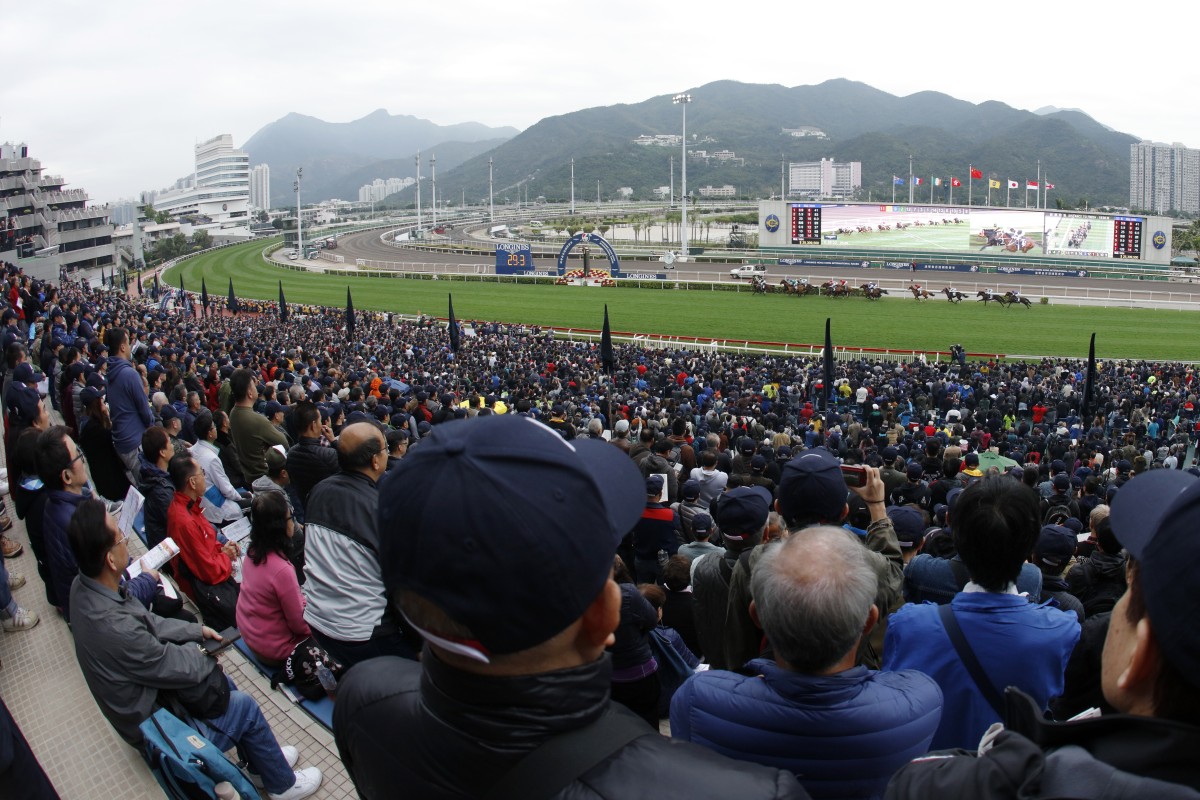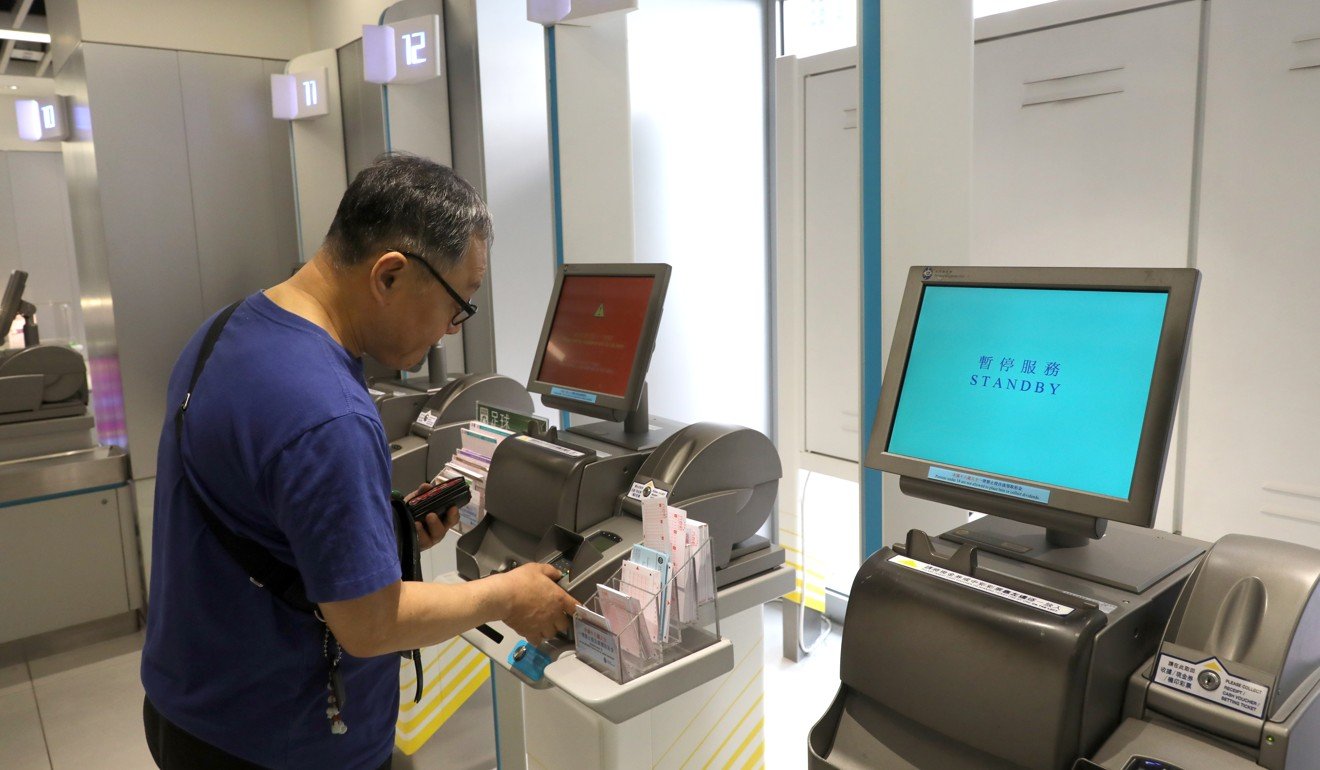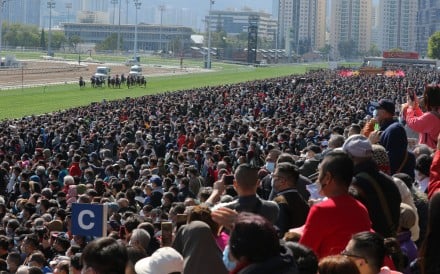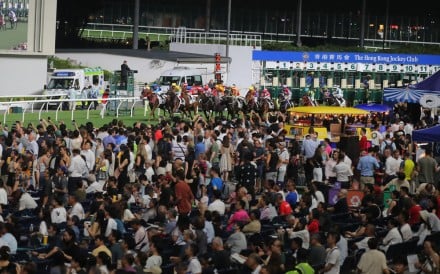The Hong Kong Jockey Club’s betting turnover on racing plunged HK$1.6 billion from the start of March until the end of June, virtually falling off a cliff after more than a decade of enormous growth.
Racing turnover more than doubled from 2005-06 (HK$60 billion) to 2017-18 (HK$124 billion), so the sudden dip has many espousing theories about what has gone wrong.
Turnover is the lifeblood of racing – it single-handedly supports the industry, enabling the Jockey Club to be the highest taxpayer in Hong Kong while also being a major charity donor. Without it, everyone suffers.
“It is probably a long story to explain what has happened,” Jockey Club chief executive Winfried Engelbrecht-Bresges told the Post. “It is complex – from competition, from product, from customer segments, the commingling, the illegal market – it has to be a holistic discussion.
“You need turnover for the long-term sustainability of the sport. We knew when we did our budget [for this season] that there would likely be a correction. [We were facing some] difficult challenges.”
To provide some context, in 1998-99 the Jockey Club had two million customers in what many remember as “the good old days” but itbecame complacent and that number more than halved to 900,000 in 2005-06.
Knowing it needed to reinvent itself, officials at Sports Road embarked on a revitalisation project from the start of the 2006-07 season, spending somewhere between HK$7-8 billion in upgrading facilities, technology, racing and the entire customer experience. It also introduced rebates to encourage bigger punters to spurn other markets, dangling a return of 10 per cent for losing bets of HK$10,000 or more.
To get these reforms past the government, the Jockey Club had to guarantee HK$8 billion in revenue for three years, which also meant it had to hand over 75 per cent of its gross margin in tax.
It forms the foundation of the system still in use today, with customer numbers returning to 1.5 million. That led to more turnover, more money for the Jockey Club (to do things like invest HK$3.7 billion in the Conghua facility in the mainland) and more tax for the government (up to over HK$13 billion last season).
Jockey Club lures better horses and jockeys with HK$1.3 billion in prize money
It was all going swimmingly (with only a couple of little hiccups, including the 2008 financial crisis), until March.
In February, year-on-year turnover was up HK$379 million but then came a HK$125 million deficit in March. It got no better in April (down HK$209 million), before collapsing in May (down HK$545 million) and June (down HK$725 million).
Engelbrecht-Bresgessaid reduced betting byowners – one of the Jockey Club’s biggest spending groups – played a huge role.
“The owner segment is the most valuable and there was a weakness starting in April last year,” he said. “People who bet less than HK$10 million, we saw some growth. What really hit us is people who bet more than HK$10 million. They are really the key drivers of turnover. They are affected by a trade war, uncertain economic outlook.
“They don’t bet fewer transactions, it’s just the amount per transaction – 10, 15, 20 per cent. That is in the owners’ segment – it has led to negative growth.
“It’s the same in the members’ section. They are a small group, but key contributors to turnover. We have not seen a drop in the interest, how many times they come, how many times they bet, but the betting amount per transaction has been reduced.
“We see a similar trend with the public to the owners, but not as profound – they bet around 5 to 6per cent less.”
Because the population in Hong Kong is not growing, the Jockey Club has to look abroad, making commingling a key component of its strategy. Commingling – where international partners bet directly into the Jockey Club pools (thus giving everyone a cut of the action) – has grown enormously in the past three seasons.
Jockey Club makes desperate money grab as turnover plummets
Part of that is because of new regulations – for example, Australia and England made betting overseas illegal – which meant punters in those jurisdictions whose money was being counted as “Hong Kong” (betting through a HKJC account) have now switched to “commingling” (betting through a partner like Tabcorp or Betfred).
But there was also a growing awareness and promotion of Hong Kong racing internationally, with larger pools providing a better value proposition for punters looking for greater price surety. Commingling grew from HK$3.48 billion in 2015-16, to HK$6.5 billion in 2016-17 and jumped to HK$16.58 billion last season.
It all turned in mid-April. The year-on-year numbers, which had shown consistent growth up until that stage, suddenly dropped by anywhere between 10 and 36 per cent per meeting (from HK$18.27 million to HK$104.3 million).
The initial fluctuation was blamed on a computer glitch, but when it continued it was discovered the professional punters who were betting through the tote in England virtually stopped betting. Scuttlebutt suggests there was an issue with rebates.
“The owner of the tote, Betfred, probably pushed the business pretty hard [early] and they sold it to a new operator,” Engelbrecht-Bresges said. “There seems to be a change in customer relationships and that has definitely [affected us]. If you look at [Monday, July 1], we were HK$46 million less than last year. That practically explains the major impact.
“I think this will continue. It’s the new normal and we have to live with the reduced turnover from commingling. But if you look overall, we still think we will be about 7 to 8 per cent over last year.”
Despite the warning signs, the Jockey Club is not panicking and focused on addressing the issues at hand.
Thanks to a surprising uptick in the past two meetings, turnover will only be marginally down on last season (less than 0.5 per cent) and the gross margin will actually be up – the benefit of not handing back as many rebates.
Football betting has also increased so in terms of the overall pie, the government won’t be missing out on any tax, and charities will still benefit, but there are real concerns on a racing front.
Resolution imminent in Hong Kong-Australia quarantine quarrel
Race programming will be addressed, there will be an in-depth analysis of the betting products, and new technologies and protocols will be assessed.
“Worldwide we have too much product, only the best product – regarding quality of horses, quality of jockeys, quality of trainers, integrity, competitiveness of fields, value for customers – will be dominant,” Engelbrecht-Bresges said. “That’s why we have to keep our strategy focused. We have to drive to be more attractive.
“I think in a two- or three-year perspective I can see a lot of growth from these initiatives but the next year will probably be more challenging.
“But the base we have is pretty high, we can weather storms. We have a strong resilience but you cannot be complacent and we won’t be complacent.”






















